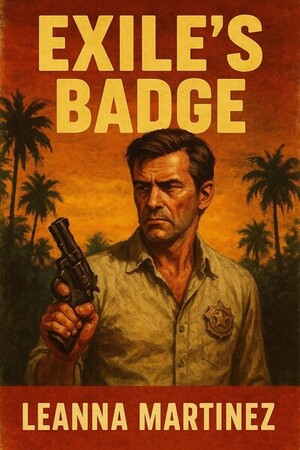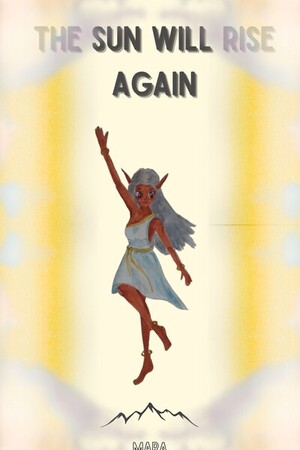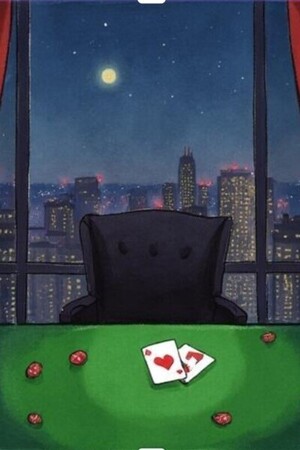Chapter 11:
Ashes and Embers
Exile's Badge
The docks at night felt like another country. Fog rolled thick from the bay, swallowing the warehouses in damp silence, the skyline of San Francisco reduced to a faint smear of light far behind him. Out here the city was just a rumor, something distant and untouchable, while the air reeked of salt, diesel, and rust.
Sam sat in his car with the engine off, the cold creeping through the frame until it reached his bones. The revolver lay on the passenger seat, heavy and silent, its dull steel catching what little light leaked from the dockside lamps. He hadn’t eaten in a day, hadn’t slept more than an hour at a time, but none of that mattered. The hunger sharpened him, the exhaustion hollowed him out until there was nothing left but focus.
This was it. His last chance. His last stand.
He rubbed at his eyes, skin stretched taut over cheekbones that hadn’t felt a razor in days. The whiskey had left its familiar burn in his throat, but tonight he needed the edge of clarity more than the fog of drink. He watched the warehouse doors across the lot, the same ones he’d been watching for weeks, waiting for the night when Caruso would finally step into the open.
The silence broke with the low hum of engines. Headlights cut through the mist, and a convoy of black sedans rolled in, their tires crunching on gravel. Sam straightened in his seat, hand brushing the revolver, pulse steadying into something calm and cold.
The cars lined up neat and deliberate, doors opening in practiced sequence. Caruso emerged from the center sedan, flanked by lieutenants. He looked untouched by the fog, wrapped in a tailored suit, hair neat, laughter spilling into the night as though the damp air itself bent to accommodate him.
Sam’s jaw tightened.
He lifted the revolver from the seat and held it low, barrel resting against his thigh. His eyes measured everything: the distance from car to door, the angles of the streetlamps, the rhythm of Caruso’s stride. He noted the exact seconds when Caruso walked between his men, unshielded, vulnerable.
One shot. That was all it would take.
Caruso paused to shake a hand, the gesture casual, practiced, as if he had no reason to fear anything. His lieutenants orbited him with easy confidence, scanning the lot but never looking high enough, never considering the shadows Sam occupied.
Sam’s breathing slowed. The revolver felt like an extension of his arm now, natural, inevitable. His finger rested along the trigger guard, the old training guiding him without thought.
Through the mist he could see Caruso’s smile, white against the dark, the same smile that had carried him through churches, fundraisers, council meetings. The same smile Sam had watched spread across newspaper columns as though the man had already claimed the city.
Sam adjusted his stance, shifted the revolver higher. His heart didn’t race. If anything, it slowed, each beat deliberate, each breath measured. He was back in control, the kind of control he hadn’t felt since the night Maggie and Emily’s car went off the highway.
Caruso moved again, stepping away from the knot of men, heading toward the warehouse doors. For a fleeting moment, he was framed by the lamplight, alone.
A perfect shot.
Sam exhaled slowly, sighted down the line of steel, and let the rest of the world fall away.
* * *
Sam eased the car door open, the fog swallowing the faint click of metal. He slid into the night, revolver heavy in his coat pocket, and moved along the line of stacked shipping crates. The air reeked of rust and diesel, his shoes silent on the damp pavement. Every shadow seemed to lean toward him, urging him forward.
A rusted ladder clung to the side of a warehouse. He climbed it slowly, careful with every step, until he reached the catwalk above. From there, the whole dock spread before him: the parked sedans, the shifting silhouettes of Caruso’s men, the yawning black mouth of the warehouse doors.
He crouched low, pulling the revolver free. It was heavier than it had ever felt, dragging at his wrist like the weight of everything he’d lost. His breathing fell into rhythm, measured and steady. Training took over—the old habits carved into him by years of work. He’d held men at gunpoint before, had leveled the barrel at faces far more dangerous than Caruso’s lieutenants. But this wasn’t about duty anymore. This was personal.
Below, Caruso moved easily through his men, shaking hands, giving out quiet smiles. The fog diffused the light, wrapping him in a halo that made him look untouchable, a king on his court. Sam tracked him carefully, eyes narrowing at the moments when the lieutenants drifted away, leaving their boss briefly exposed.
Then it came.
Caruso turned, speaking with one man while the others stepped back toward the warehouse. For a handful of seconds, he was alone, framed in the lamplight, his laughter carrying faintly through the fog.
Sam raised the revolver, sighting down the line of steel. His heartbeat slowed, his breath drawn long and steady. The world muffled itself, all sound drowned under the hush of blood in his ears. The fog, the sedans, the city, they all vanished until there was only the man in his sights.
His finger curled against the trigger. Just pressure, and it would be done. Caruso’s laughter would cut off mid-breath, his body crumpling to the gravel, the empire around him thrown into chaos.
For a moment, Sam let himself imagine it. He pictured the headline: Respected Businessman Slain in Gangland Hit. He pictured the whispers in City Hall, the panic among the council, the sudden collapse of Caruso’s perfect mask. It felt like justice. It felt like balance.
Then Maggie’s face broke through the fog.
Her smile on a quiet morning, hair damp from the shower, asking him if he’d be home for dinner. Emily’s laughter followed, high and bright, echoing in his chest. He saw her crayon drawings on the refrigerator, yellow suns and crooked houses, the family always smiling, always holding hands.
He blinked, and the memory twisted. The crayon sun dimmed, the rabbit lay broken on the highway asphalt, Maggie’s voice turned into silence.
His hand trembled.
Pulling the trigger wouldn’t bring them back. It wouldn’t erase the silence of the house or fill the empty chair at the kitchen table. It wouldn’t cleanse the rot spreading through the city. It would only make him part of it. Another man who solved problems with blood. Another shadow like Caruso.
He steadied his breath, forcing the barrel to hold still. His finger pressed harder against the trigger. Just a little more and the choice would be over.
But deep down he knew: the moment he fired, he’d lose the last piece of himself that hadn’t already been stripped away. The part Maggie had loved. The part Emily had looked up to.
Sam exhaled slowly. The fog swallowed the sound.
And he eased his finger off the trigger.
The revolver lowered inch by inch, heavier now than when he’d raised it. His arm ached from the weight, but it wasn’t the steel dragging him down. It was the knowledge that justice would never come from a gun.
Below, Caruso’s laughter rang out again, untouched.
Sam crouched back against the railing, the revolver resting in his lap, his chest hollow and burning.
* * *
Sam’s breath hissed between his teeth as he eased his finger off the trigger. The revolver dipped, inch by inch, until the barrel pointed toward the catwalk’s floor. His arm throbbed with the effort, muscles stiff from holding still too long. The gun felt heavier now than when he had first raised it, as though it had absorbed all the weight he’d meant to unleash.
He crouched against the railing, chest tight, the fog beading cold on his skin. For a moment, he let the silence claim him, willing his heartbeat to slow, to disappear entirely.
Then Caruso turned.
It was subtle, almost casual, a shift of his head, a glance over his shoulder. But his eyes found Sam’s through the mist as if the fog had never existed. For one suspended second, the two men stared at each other across the expanse of steel and smoke.
Caruso’s mouth curved. Not a broad grin, not the polished smile he wore for politicians and priests, but something smaller, sharper. A knowing smirk. Contempt laced with admiration, as if to say: You had your chance. You couldn’t take it.
He didn’t raise an alarm. He didn’t shout. He didn’t even stop walking. He simply turned back toward his lieutenants, gave a brief nod, and strolled into the warehouse, laughter already curling back into his voice.
Sam stayed frozen, revolver slack in his grip, until the warehouse doors shut behind Caruso. The sound was final, iron on iron, echoing like the end of a trial.
Slowly, deliberately, Sam slid the revolver back into its holster. The motion felt hollow, ritualistic, like folding a flag over a grave. He rose, joints stiff, and stepped away from the railing. His boots made no sound against the catwalk, as though the fog itself wanted to keep his retreat a secret.
The night pressed closer around him as he retraced his path, back down the ladder, across the cracked concrete, between the stacks of crates. The mist licked at his coat, clung to his hair, seeped into his lungs until every breath tasted of salt and rust. He walked as though underwater, heavy and slow, each step sinking into the inevitability of failure.
When he reached his car, he slid into the driver’s seat and shut the door. The silence inside was suffocating. He pulled the revolver free again, laid it across his lap, and rested both hands on it. The steel was cold, solid, unforgiving.
Through the windshield, the city skyline glowed faintly beyond the fog. It looked far away, like a memory of light rather than the thing itself. He stared at it, eyes burning but dry, as though some part of him had already gone with the gun when he lowered it.
He hadn’t killed Caruso. He hadn’t saved anyone. He had only survived.
The embers of rage still smoldered in his chest, but the fire was gone. All that remained was smoke, curling inward, filling the hollow places where conviction used to burn.
Sam leaned back in the seat, the revolver heavy on his lap, and closed his eyes. The fog pressed harder against the glass, and the night offered no comfort.




Please sign in to leave a comment.